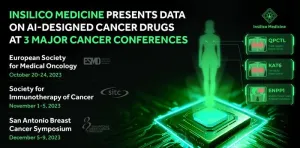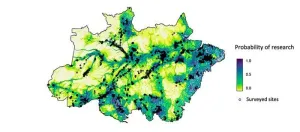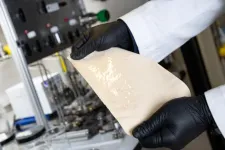(Press-News.org) When walking on the sidewalk, a person is able to avoid puddles, other walkers, and cracks in the pavement. It may seem intuitive – and that's because it is.
There’s actually a biological component that allows humans and other mammals to navigate our complex environments. Central Pattern Generators (CPG) are neural networks that produce rhythmic patterns of control signals for limbs using simple environmental cues. When we quickly step away to avoid something blocking our path, that’s our CPGs doing their job.
Rajkumar Kubendran, principal investigator and assistant professor of electrical and computer engineering of the University of Pittsburgh, received a $1,606,454 award from the National Science Foundation to lead a two-year project to engineer these neural networks in robots. Feng Xiong, associate professor of electrical and computer engineering at Pitt, and M.P. Anantram, professor of photonics and nano devices at the University of Washington, will serve as co-principal investigators.
“While these networks are natural for us, there is currently no efficient way to replicate them using electronic devices and computers,” Kubendran explained. “Agile robots that can explore unknown and treacherous terrains have the potential to enable autonomous navigation for commercial transport, enhance disaster response during floods and earthquakes or to remote and unsafe areas like malfunctioning nuclear plants or space exploration.”
A Robot on the Move
Building bio-inspired robots isn’t something new, but modeling, designing and implementing neuromorphic networks with synapses and neurons inside miniature robots is a novel step forward – or, in the robot’s case, also backwards, left and right.
Neuromorphic engineering – computing inspired by the human brain – will be key to achieving efficient, adaptive sensorimotor control in these robots.
“We aim to demonstrate a fully functional quadropod or hexapod robot that can learn to move, using principles informed by neuroscience, leading to biomimetic sensorimotor control for energy-efficient locomotion, using learning algorithms running on bio-realistic neural networks, built by using semiconductor technology that expands beyond its normal limits,” Kubendran said.
These robots will be able to avoid a puddle just as intuitively as humans by constantly learning about movement. The group will take inspiration from neural circuitry found in biology that supports agile movement control. The team plans to incorporate non-linear temporal dynamics in mixed-feedback systems to build bio-inspired neural networks and implement them on scalable energy-efficient hardware.
To meet the challenging demands of neuromorphic engineering, the team is also developing the NeuRoBots educational consortium. The consortium will train a new generation of engineers and researchers through evidence-based best practices to prepare them for the rapidly evolving needs of the industry.
“The breadth of skill sets that are required to effectively train a new cadre of workforce in neuromorphic computing for robotics makes curriculum design and integration with existing frameworks challenging,” Kudendran said. “We need help to prepare our engineers for this changing technical environment.”
The project, “Bio-inspired sensorimotor control for robotic locomotion with neuromorphic architectures using beyond-CMOS materials and devices,” is set to begin in 2024 and is part of a larger, $45 million initiative by the NSF to invest in the future of semiconductors.
END
The new robot is taking its first intuitive steps
2023-10-16
ELSE PRESS RELEASES FROM THIS DATE:
Neutrons see stress in 3D-printed parts, advancing additive manufacturing
2023-10-16
Using neutrons to see the additive manufacturing process at the atomic level, scientists have shown that they can measure strain in a material as it evolves and track how atoms move in response to stress.
The automotive, aerospace, clean energy and tool-and-die industries — any industry that needs complex and high-performance parts — could use additive manufacturing,” said Alex Plotkowski, materials scientist in ORNL’s Materials Science and Technology Division and the lead scientist of the experiment. Plotkowski and his ...
How to tell if your boss is a ‘corporate psychopath’
2023-10-16
Findings from research to help the business world identify destructive ‘corporate psychopaths’ will be presented at the Chelmsford Science Festival on Monday, 23 October.
Dr Clive Boddy of Anglia Ruskin University, a pioneer in the field of corporate psychopathy, will discuss his research, published in the International Journal of Market Research, looking at how the financial industry can identify, manage and, if necessary, remove these individuals.
Around 1% of the adult population are ...
Ochsner Health Recipient of the 2023-24 WebMD Choice Awards
2023-10-16
NEW ORLEANS, La. - Ochsner Health was named among the “Best Hospitals According to Patients & Health Care Providers” by WebMD, an online publication for health news and information.
The 2023 WebMD Choice Awards recognized a select group of 167 health systems with Elite Choice Awards, WebMD Patient Choice Awards, and Medscape Physician Choice Awards. Results were gathered via a survey of a national audience encompassing thousands of patients and healthcare clinicians to determine which hospitals they believe deliver the best quality and treatments. The awards program identifies the “best in class” ...
Carnegie Mellon University's Synergy Lab releases three papers on ubiquitous sensing
2023-10-16
Researchers from Carnegie Mellon's Systems, Networking, and Energy Efficiency (Synergy) Lab will present several multi-year studies on their work around ubiquitous sensing at this week's ACM International Joint Conference on Pervasive and Ubiquitous Computing (UbiComp).
The works unveil several innovative systems and explain how the collected data can be converted to offer useful insights, all while ensuring the privacy of the individuals being monitored.
Led by School of Computer Science Associate Professor Yuvraj Agarwal, ...
Insilico Medicine presents data on AI-designed cancer drugs at 3 major cancer conferences
2023-10-16
Clinical stage artificial intelligence (AI) drug discovery company Insilico Medicine (“Insilico”) has been invited to present scientific data on its novel anti-cancer assets at three major upcoming cancer conferences -- the European Society for Medical Oncology (ESMO) conference in Madrid Oct. 20-24, 2023; the Society of Immunotherapy of Cancer (SITC) conference Nov. 1-5, 2023 in San Diego; and the San Antonio Breast Cancer Symposium (SABCS) Dec. 5-9, 2023.
Small molecule oncology ...
American Society of Anesthesiologists recognizes Philip G. Morgan, M.D., and Margaret M. Sedensky, M.D., with its Excellence in Research Award
2023-10-16
SAN FRANCISCO — The American Society of Anesthesiologists (ASA) today presented Philip G. Morgan, M.D., and Margaret M. Sedensky, M.D., with its 2023 Excellence in Research Award in recognition of their extensive research focused on understanding how anesthetics work and whether certain anesthetics are safe for children with mitochondrial disease. The award is presented annually for outstanding achievement in research that has had, or is likely to have, an important impact on the practice of anesthesiology.
Drs. Morgan and Sedensky are professors in the Department of Anesthesiology ...
Study reveals areas of Brazilian Amazon where no ecological research has been done
2023-10-16
Many parts of the Brazilian Amazon are neglected in ecological research, for several reasons, according to an article published in the journal Current Biology. Authored by Joice Ferreira of the Federal University of Pará (UFP) and colleagues from many countries who also belong to the Synergize Consortium, the article identifies the areas missing from ecological research and the factors that have determined these gaps, pinpointing opportunities for the planning of new investments in research ...
New polymer membranes, AI predictions could dramatically reduce energy, water use in oil refining
2023-10-16
A new kind of polymer membrane created by researchers at Georgia Tech could reshape how refineries process crude oil, dramatically reducing the energy and water required while extracting even more useful materials.
The so-called DUCKY polymers — more on the unusual name in a minute — are reported Oct. 16 in Nature Materials. And they’re just the beginning for the team of Georgia Tech chemists, chemical engineers, and materials scientists. They also have created artificial intelligence tools to predict the performance of these kinds of polymer membranes, which could accelerate development of new ones.
The implications are stark: ...
Firearm exposure associated with poorer health in communities around the U.S.
2023-10-16
Gun violence is tied to poverty, unemployment, broken families, disengaged youth and racial segregation, according to a study by the New Jersey Gun Violence Research Center at Rutgers.
Published in the Journal of Urban Health, the study found that people living in disadvantaged communities face gun violence at higher levels that are harmful to the health and well-being of whole neighborhoods.
“Many of America’s most disadvantaged neighborhoods are stuck in a vicious cycle of violence and collateral damage that is almost impossible to escape,” ...
Transforming wastewater into valuable chemicals with sunlight
2023-10-16
Researchers led by Prof. GAO Xiang from the Shenzhen Institute of Advanced Technology (SIAT) of the Chinese Academy of Sciences and Prof. LU Lu from the Harbin Institute of Technology have proposed a novel method to transform wastewater contaminants into valuable chemicals using sunlight, thus paving the way for sustainable and eco-friendly chemical manufacturing.
The study was published in Nature Sustainability on Oct. 16.
Conventional chemical manufacturing relies on energy-intensive processes. Semiconductor biohybrids, integrating efficient light-harvesting materials with superior living cells, have emerged as an exciting advancement ...





